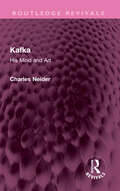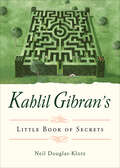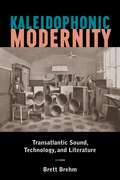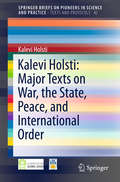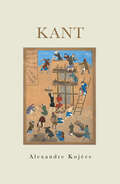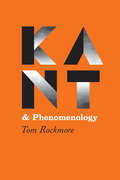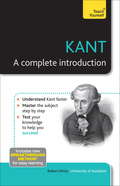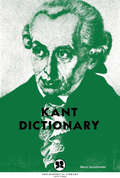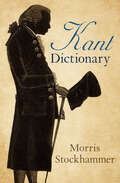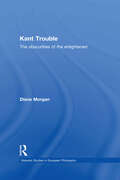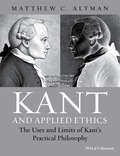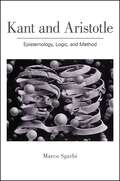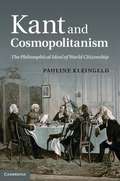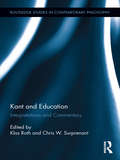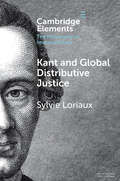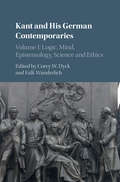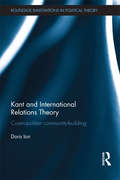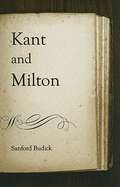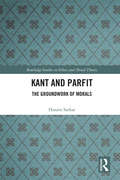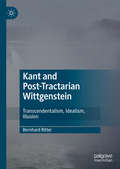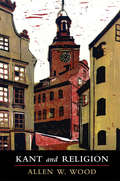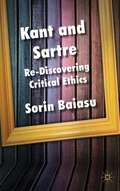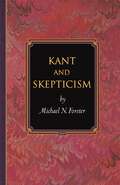- Table View
- List View
Kafka: His Mind and Art (Routledge Revivals)
by Charles NeiderFirst published in 1949, Kafka: His Mind and Art begins with an extended analysis of the Kafka literature, with emphasis on its shortcomings and their effect on Kafka’s vogue. Chapter two presents in broad terms a new aspect of Kafka which after the biographical chapter, chapter three, is studied in detail for the next two chapters. Up to this point the treatment does not presuppose a special key, but in chapters six and seven the secret key is discussed. To avoid confusion and unnecessary complications, the discussion of the key and its implications is delayed until more traditional ground has been covered. The author argues that it is appropriate to indicate only that the expressionist movement was not solely religious, that it arose from a dissatisfaction with a stagnant, spiritless society as well as with current modes in art and literature, and that Kafka avoided identifying himself- at least in his work- with any of the three or four factions of the movement. This is an important historical document for students of literature.
Kahlil Gibran's Little Book of Secrets
by Kahlil Gibran Neil Douglas-KlotzOne of the most popular and profound inspirational writers of all time explores the mysteries of life. Here is bite-sized wisdom for daily living in a beautiful gift package.This book is a collection of Gibran's words on life's big questions and the mysteries of the spiritual path. It is an exploration of the riddles and conundrums that are part of the fabric of existence, and it is an attempt to penetrate and explain the mysteries of life.Gibran was fascinated by life's puzzles and riddles--those questions that cause us to stop what we are doing and ask, "Why?" Here are his musings about the seemingly unanswerable questions and his exploration of good and evil, love and hate, and the difference between appearances and reality.Kahlil Gibran's Little Book of Secrets is organized into five sections that elucidate the key issues and questions that each of us face:1.Entering the Labyrinth of Life2.Secrets of Life and Death3.Life's Ups and Downs4.Secrets of Good and Evil5.Traveling the Inner PathThis inspirational gift volume gently guides readers through life's big issues: meaning and mortality, good and evil, and discovering an authentic spiritual path. Suitable for all gift-giving occasions, it is a book that delights, informs, and inspires.
Kaleidophonic Modernity: Transatlantic Sound, Technology, and Literature
by Brett BrehmWhat stories remain hidden behind one of the most significant inventions of the nineteenth century? Kaleidophonic Modernity reexamines the development of mechanical sound recording technology by charting the orbits of writers, scientists, and artists in France and the United States. Working between comparative literature, the history of science, and urban studies, Brehm builds a bridge between visual culture and sound studies.Kaleidophonic Modernity places the poet and inventor Charles Cros and his lover, the celebrated concert pianist and salonnière Nina de Villard at the heart of modern aesthetic and scientific vanguards. Cros's scientific endeavors ranged from color photography, to telecommunications, to mechanical sound reproducibility. In his poetry the Surrealists found an ancestor and inspiration. His literary and scientific works prove startling and relevant to predicaments of technological media in his own time and ours. For nearly twenty years Nina de Villard presided over a supremely daring intellectual salon. There, she welcomed manifold literary, artistic, and musical luminaries into a veritable crucible of the artistic avant-garde and precursor to the famous Chat Noir cabaret. Together, these two forgotten but pivotal figures, Cros and Villard, help reframe our thinking on Edgar Allan Poe, Charles Baudelaire, and Walt Whitman, icons of urban modernity who can now be seen and heard in a kaleidophonic light, one that offers a compelling new perspective on modern mediascapes.In elaborating this transatlantic phenomenon, Kaleidophonic Modernity illuminates the prehistory of the phonograph as it intersects with the aesthetics of sound reproducibility, Franco-American literary exchange, Poe’s aesthetic and intellectual legacy, the sounds of modern cities and technologies, and the genealogy of audiovisual experimentation found in such movements as Dada, Futurism, and the sound art of today.
Kalevi Holsti: Major Texts on War, the State, Peace, and International Order
by Kalevi HolstiIn honour of Prof. Kalevi Holsti's 80th birthday, this book includes key texts by the renowned Canadian International Relations scholar on war, the state, peace, and the international order. The first part includes texts on the Study of War, Use of Force in International Politics: Four Revolutions, and The Decline of Interstate War, while the second part analyses International Sports Competition and the Creation and Sustenance of Statehood, as well as Internationalism and Nationalism within the Multi-Community State. The third part addresses The Peacemakers: Issues and International Order, Governance Without Government: Polyarchy in 19th-Century European International Politics, and The Post-Cold War 'Settlement' in Comparative Perspective. Prof. Holsti is a former president of the International Studies Association and the author of a major textbook that was translated into Mandarin, Korean, Japanese, and Bahasa Indonesian. Thousands of undergraduates around the world are acquainted with his work.
Kant
by Alexandre KojèveKant forms the centerpiece of Alexandre Kojeve&’s intriguing discovery of objective reality and its repressed history in Western philosophyImmanuel Kant&’s philosophical system, Kojève argues, is haunted by the Thing-in-itself as the ultimate expression of &‘bourgeois hypocrisy&’ and its internally divided reason, split between action and discourse. Making a case for the post-historical moral imperative to turn away from infinite progress and the practical justification of the ideas of God and the immortality of the soul, Kant outlines the material conditions of possibility for revolutionary action within the twin horizons of accomplished and recollected history.
Kant & Phenomenology
by Tom RockmorePhenomenology, together with Marxism, pragmatism, and analytic philosophy, dominated philosophy in the twentieth century—and Edmund Husserl is usually thought to have been the first to develop the concept. His views influenced a variety of important later thinkers, such as Heidegger and Merleau-Ponty, who eventually turned phenomenology away from questions of knowledge. But here Tom Rockmore argues for a return to phenomenology’s origins in epistemology, and he does so by locating its roots in the work of Immanuel Kant.Kant and Phenomenology traces the formulation of Kant’s phenomenological approach back to the second edition of Kant’s Critique of Pure Reason. In response to various criticisms of the first edition, Kant more forcefully put forth a constructivist theory of knowledge. This shift in Kant’s thinking challenged the representational approach to epistemology, and it is this turn, Rockmore contends, that makes Kant the first great phenomenologist. He then follows this phenomenological line through the work of Kant’s idealist successors, Fichte and Hegel. Steeped in the sources and literature it examines, Kant and Phenomenology persuasively reshapes our conception of both of its main subjects.
Kant (Great Books of The Western World,42)
by Immanuel Kant Mortimer J. Adler Robert Maynard HutchinsThe critique of pure reason; The critique of practical reason and other ethical treatises; The critique of judgement.
Kant - A Complete Introduction: Teach Yourself
by Robert WicksWritten by Robert Wicks, a recognised Kant specialist who teaches at the University of Auckland, Kant: A Complete Introduction is designed to give you everything you need to succeed, all in one place. It covers the key areas that students are expected to be confident in, outlining the basics in clear jargon-free English, and then providing added-value features like summaries of key books, and even lists of questions you might be asked in your seminar or exam. The book uses a structure that mirrors many university courses on Freud and psychoanalysis - explaining and contextualising Kant's theories, which have been among the most influential in Philosophy. The book starts by introducing Kant and his way of thinking and arguing, before looking at how Kant answered three key questions: What can I know? What should I do? What may I hope? In doing so, Professor Wicks introduces the reader to all of Kant's key work, including The Critique of Pure Reason. Teach Yourself titles employ the 'Breakthrough method', which is designed specifically to overcome problems that students face. - Problem: 'I find it difficult to remember what I've read.'; Solution: this book includes end-of-chapter questions and summaries, and flashcards of key points available on-line and as apps - Problem: 'Most books mention important other sources, but I can never find them in time.'; Solution: this book includes key texts and case studies are summarised, complete with fully referenced quotes ready to use in your essay or exam. - Problem: 'Lots of introductory books turn out to cover totally different topics than my course.'; Solution: this book is written by a current university lecturer who understands what students are expected to know.
Kant Dictionary
by Morris StockhammerThe material contained in this dictionary is designed to provide a concise tool of penetration into Kant's system of thought, a system that by virtue of its complexity and linguistic difficulties has long been almost the exclusive property of scholars. Professor Stockhammer has extracted from the vast body of Kant's literature the essential concepts, terms, meanings and definitions of his system, and has arranged them in such a way as to give a clear exposition of Kant's dualistic philosophy. The author, a Viennese Doctor of Philosophy, is one of the eminent Kantians of our time and author of many works in the field. The Kant Dictionary is an extensive collaboration of Kant's philosophy by Morris Stockhammer. Morris Stockhammer is a Professor and a Viennese Doctor of Philosophy. Professor Stockhammer has extracted from the vast body of Kant's literature the essential concepts, terms, meanings and definitions of his system and has arranged them in such a way as to give a clear expositon of Kant's dualistic philosophy.
Kant Dictionary
by Morris StockhammerAn accessible A-to-Z reference guide to the complex works of the eighteenth-century philosopher.A great thinker of the Enlightenment, Immanuel Kant was born in Königsberg, Prussia, in 1724. He rarely left his hometown and never left his country. He did, however, frequently venture into the spiritual and boundless realm of human thinking, from which he brought back his great philosophical works. In the Kant Dictionary, editor Morris Stockhammer brings together essential concepts, terms, meanings, and definitions from Kant&’s vast body of work. The goal was to provide a concise reference tool that penetrates Kant&’s complex system of thought and elucidates his philosophy. Now students and laypeople may have easier access to works once limited to scholars.
Kant Selections
by Theodore Meyer GreeneAn antique book, republished, on the philosophical writings of Immanuel Kant , an eminent philosopher.
Kant Trouble: Obscurities of the Enlightened (Warwick Studies in European Philosophy)
by Diane MorganKant Trouble offers a highly original and incisive reading of some of the lesser known aspects of Kantian thought. Throughout Morgan challenges the widely held view of Kant as the exponent of concrete and rigid rationality and argues that his airtight 'architectonic' mode of reasoning overlooks certain topics which destabilise it. These include temporary forms of architecture, such as landscape gardening; examples which undermine the autonomy of the Kantian subject, for example, freemasonry; and the concept of radical evil, all of which suggest that Kant's thought was capable of accommodating troubling and subversive themes. Morgan's compelling discussion arrives at a fresh and ground breaking perspective on Kant whereby he is no longer to be regarded as a concrete rationalist, but as a daring thinker, not afraid to entertain ideas highly threatening to his own system and to the humanistic legacy of the enlightenment.
Kant and Applied Ethics: The Uses and Limits of Kant's Practical Philosophy
by Matthew C. AltmanKant and Applied Ethics makes an important contribution to Kant scholarship, illuminating the vital moral parameters of key ethical debates. Offers a critical analysis of Kant’s ethics, interrogating the theoretical bases of his theory and evaluating their strengths and weaknesses Examines the controversies surrounding the most important ethical discussions taking place today, including abortion, the death penalty, and same-sex marriage Joins innovative thinkers in contemporary Kantian scholarship, including Christine Korsgaard, Allen Wood, and Barbara Herman, in taking Kant’s philosophy in new and interesting directions Clarifies Kant’s legacy for applied ethics, helping us to understand how these debates have been structured historically and providing us with the philosophical tools to address them
Kant and Aristotle: Epistemology, Logic, and Method
by Marco SgarbiKant and Aristotle reassesses the prevailing understanding of Kant as an anti-Aristotelian philosopher. Taking epistemology, logic, and methodology to be the key disciplines through which Kant's transcendental philosophy stood as an independent form of philosophy, Marco Sgarbi shows that Kant drew important elements of his logic and metaphysical doctrines from Aristotelian ideas that were absent in other philosophical traditions, such as the distinction of matter and form of knowledge, the division of transcendental logic into analytic and dialectic, the theory of categories and schema, and the methodological issues of the architectonic. Drawing from unpublished documents including lectures, catalogues, academic programs, and the Aristotelian-Scholastic handbooks that were officially adopted at Königsberg University where Kant taught, Sgarbi further demonstrates the historical and philosophical importance of Aristotle and Aristotelianism to these disciplines from the late sixteenth century to the first half of the eighteenth century.
Kant and Cosmopolitanism
by Pauline KleingeldThis is the first comprehensive account of Kant's cosmopolitanism, highlighting its moral, political, legal, economic, cultural and psychological aspects. Contrasting Kant's views with those of his German contemporaries and relating them to current debates, Pauline Kleingeld sheds new light on texts that have been hitherto neglected or underestimated. In clear and carefully argued discussions, she shows that Kant's philosophical cosmopolitanism underwent a radical transformation in the mid 1790s and that the resulting theory is philosophically stronger than is usually thought. Using the work of figures such as Fichte, Cloots, Forster, Hegewisch, Wieland and Novalis, Kleingeld analyses Kant's arguments regarding the relationship between cosmopolitanism and patriotism, the importance of states, the ideal of an international federation, cultural pluralism, race, global economic justice and the psychological feasibility of the cosmopolitan ideal. In doing so, she reveals a broad spectrum of positions in cosmopolitan theory that are relevant to current discussions of cosmopolitanism.
Kant and Education: Interpretations and Commentary (Routledge Studies in Contemporary Philosophy)
by Chris W. Surprenant Klas RothImmanuel Kant’s moral philosophy, political philosophy, and philosophy of judgement have been and continue to be widely discussed among many scholars. The impact of his thinking is beyond doubt and his ideas continue to inspire and encourage an on-going dialogue among many people in our world today. Given the historical and philosophical significance of Kant’s moral, political, and aesthetic theory, and the connection he draws between these theories and the appropriate function and methodology of education, it is surprising that relatively little has been written on Kant’s contribution to education theory. Recently, however, internationally recognized Kant scholars such as Paul Guyer, Manfred Kuehn, Richard Velkley, Robert Louden, Susan Shell, and others have begun to turn their attention to Kant’s writings on education and the role of education in cultivating moral character. Kant and Education: Interpretations and Commentary has gathered these scholars together with the aim of filling this perceived void in Kant scholarship. All of the essays contained within this volume will examine either Kant’s ideas on education through an historical analysis of his texts; or the importance and relevance of his moral philosophy, political philosophy, and/or aesthetics in contemporary education theory (or some combination).
Kant and Global Distributive Justice (Elements in the Philosophy of Immanuel Kant)
by Sylvie LoriauxThis Element argues that although Kant's political thought does not tackle issues of global poverty and inequality head on, it nonetheless offers important conceptual and normative resources to think of our global socioeconomic duties. It delves into the Kantian duty to enter a rightful condition beyond the state and shows that a proper understanding of this duty not only leads us to acknowledge a duty of right to assist states that are unable to fulfil the core functions of a state, but also provides valuable hints at what just transnational trade relations and a just regulation of immigration should look like.
Kant and His German Contemporaries
by Corey W. Dyck Falk WunderlichThis collection of new essays, the first of its kind in English, considers the ways in which the philosophy of Immanuel Kant engages with the views of lesser-known eighteenth-century German thinkers. Each chapter casts new light on aspects of Kant's complex relationship with these figures, particularly with respect to key aspects of his logic, metaphysics, epistemology, theory of science, and ethics. The portrait of Kant that emerges is of a major thinker thoroughly engaged with his contemporaries - drawing on their ideas and approaches, targeting their arguments for criticism and responding to their concerns, and seeking to secure the legacy of his thought among them. This volume will open the door for further research on Kant and his methods of philosophical inquiry, while introducing readers to the distinctive and influential philosophical contributions of several previously neglected figures.
Kant and International Relations Theory: Cosmopolitan Community-building (Routledge Innovations in Political Theory)
by Dora IonThis book challenges popular international relations theories that claim to be based on the political writings of Immanuel Kant, and sheds new light on the philosopher's perspective on peace.Through an analysis of Kant's philosophical work and political traditions of his time, as well as of neglected concepts and theory, this book reappraises modern perspectives on his work. Kant advocated a cosmopolitan community building perspective of peace and international relations that considered issues that are now significant topics of debate such as state sovereignty and unequal access to resources. This book reveals how Kant's political views translate into a vision of international relations that cannot be associated with the democratic and neoliberal theories of peace which until now have claimed Kant's legacy. While the democratic peace theory continues to inspire policy-making, Kant's predictions on war and peace ultimately prove to be most appropriate for the current issues of globalization and diversity.Offering new insights into the meaning of peace and war in international relations, Kant and International Relations Theory is an invaluable resource for students and scholars of international relations and political theory, as well as for those interested in Kant's scholarship.
Kant and Milton
by Sanford BudickThis book brings to bear new evidence and long-neglected materials to show the importance of Kant's encounter with Milton's poetry to the formation of Kant's moral and aesthetic thought.
Kant and Parfit: The Groundwork of Morals (Routledge Studies in Ethics and Moral Theory)
by Husain SarkarDerek Parfit’s On What Matters is widely recognized as elegant, profound, and destined to change the landscape of moral philosophy. In Volume One, Parfit argues that the distinct—indeed, powerfully conflicting—theories of deontology and contractualism can be woven together in a way so as to yield utilitarian conclusions. Husain Sarkar in this book calls this, The Ultimate Derivation. Sarkar argues, however, that this derivation is untenable. To underwrite this conclusion, this book traverses considerable Parfitian terrain. Sarkar shows why Parfit hasn’t quite solved what Sidgwick had called "the profoundest problem in ethics"; he offers a reading of Kant, Rawls, and Scanlon that reveals Parfit’s keen utilitarian bias; and he demonstrates why Parfit’s Triple Theory does not succeed in its task of unifying conflicting moral theories (without making substantial utilitarian assumptions). The final chapter of the book is about meta-ethics. It shows that Parfit’s Convergence Principle is mistaken even though it unveils Parfit’s utterly humane concerns: Moral philosophers are not, as Parfit thinks, climbing the same mountain. But for all that, Sarkar maintains, Parfit’s book is arguably the greatest consequential tract in the history of moral philosophy.
Kant and Post-Tractarian Wittgenstein: Transcendentalism, Idealism, Illusion
by Bernhard RitterThis book suggests that to know how Wittgenstein’s post-Tractarian philosophy could have developed from the work of Kant is to know how they relate to each other. The development from the latter to the former is invoked heuristically as a means of interpretation, rather than a historical process or direct influence of Kant on Wittgenstein. Ritter provides a detailed treatment of transcendentalism, idealism, and the concept of illusion in Kant’s and Wittgenstein’s criticism of metaphysics. Notably, it is through the conceptions of transcendentalism and idealism that Wittgenstein’s philosophy can be viewed as a transformation of Kantianism. This transformation involves a deflationary conception of transcendental idealism along with the abandonment of both the idea that there can be a priori 'conditions of possibility' logically detachable from what they condition, and the appeal to an original ‘constitution’ of experience. The closeness of Kant and post-Tractarian Wittgenstein does not exist between their arguments or the views they upheld, but rather in their affiliation against forms of transcendental realism and empirical idealism. Ritter skilfully challenges several dominant views on the relationship of Kant and Wittgenstein, especially concerning the cogency of Wittgenstein-inspired criticism focusing on the role of language in the first Critique, and Kant's alleged commitment to a representationalist conception of empirical intuition.
Kant and Religion (Cambridge Studies in Religion, Philosophy, and Society)
by Allen WoodThis masterful work on Kant's Religion within the Boundaries of Mere Reason explores Kant's treatment of the Idea of God, his views concerning evil, and the moral grounds for faith in God. Kant and Religion works to deepen our understanding of religion's place and meaning within the history of human culture, touching on Kant's philosophical stance regarding theoretical, moral, political, and religious matters. Wood's breadth of knowledge of Kant's corpus, philosophical sharpness, and depth of reflection sheds light not only on Kant, but also on the fate of religion and its relation to philosophy in the modern world.
Kant and Sartre
by Sorin BaiasuThis book challenges the view of the relationship between Kant's and Sartre's practical philosophies arguing that Kant was one of Sartre's most significant predecessors. The book identifies several fundamental theses of Sartre's practical philosophy, and shows Sartre to be closer to Kant in this respect than many contemporary Kantian theories are.
Kant and Skepticism (Princeton Monographs in Philosophy #32)
by Michael N. ForsterThis book puts forward a much-needed reappraisal of Immanuel Kant's conception of and response to skepticism, as set forth principally in the Critique of Pure Reason. It is widely recognized that Kant's theoretical philosophy aims to answer skepticism and reform metaphysics--Michael Forster makes the controversial argument that those aims are closely linked. He distinguishes among three types of skepticism: "veil of perception" skepticism, which concerns the external world; Humean skepticism, which concerns the existence of a priori concepts and synthetic a priori knowledge; and Pyrrhonian skepticism, which concerns the equal balance of opposing arguments. Forster overturns conventional views by showing how the first of these types was of little importance for Kant, but how the second and third held very special importance for him, namely because of their bearing on the fate of metaphysics. He argues that Kant undertook his reform of metaphysics primarily in order to render it defensible against these types of skepticism. Finally, in a critical appraisal of Kant's project, Forster argues that, despite its strengths, it ultimately fails, for reasons that carry interesting broader philosophical lessons. These reasons include inadequate self-reflection and an underestimation of the resources of Pyrrhonian skepticism.
